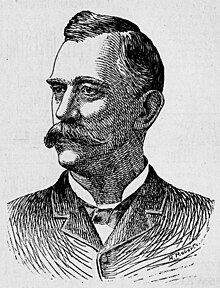Charles T. Gulick
| Charles Thomas Gulick | |
|---|---|
 |
|
| Ministry of the Interior, Kingdom of Hawaii | |
|
In office August 6, 1883 – June 30, 1886 |
|
|
In office September 12, 1892 – November 1, 1892 |
|
| Ministry of Finance, Kingdom of Hawaii | |
|
In office September 1, 1885 – June 30, 1886 |
|
| Personal details | |
| Born | July 25, 1841 |
| Died | November 7, 1897 (aged 56) Honolulu, Hawaii |
| Citizenship | Hawaiian |
| Nationality | American |
| Spouse(s) | Sarepta A. Thompson |
| Alma mater | Punahou School |
| Occupation | businessman, government minister, real estate broker |
| Known for | counter-revolution leader |
| Military service | |
| Service/branch | Honolulu Rifles |
| Rank | Captain, adjutant general |
Charles Thomas Gulick (July 25, 1841 – November 7, 1897) was a politician in the Kingdom of Hawaii. He was one of the few members of the various missionary families of the time to side with the monarchy in the 1893 overthrow of the Kingdom of Hawaii.
Gulick was born in July 25, 1841 to a family of American missionaries. His father was William Gulick, and mother was Eliza Throop Thomas (1804–1903). His father's brother Peter Johnson Gulick married his mother's sister Frances "Fanny" Hinckley Thomas (1798–1883), who had seven children (his cousins) who also became missionaries, including Luther Halsey Gulick (1828–1891) and John Thomas Gulick (1832–1923).
He attended Punahou School 1855–1862, where he was a pitcher on a team called the "Pacifics" playing early games of baseball with the sons of Alexander Cartwright. In September 1869 he officially became a citizen of the Kingdom of Hawaii. He ran a business as notary public and issued government documents such as marriage licenses. He became the commander of the original Honolulu Rifles, with rank of Captain; this unit unlike its namesake remained loyal to the monarchy until disbanded in 1874. He also later served as adjutant general from 1878. On February 5, 1876 he married Sarepta A. Thompson in Honolulu.
He was appointed to the cabinet of King Kalākaua as Minister of the Interior on August 6, 1883, and served until June 30, 1886. It is widely thought that sugar magnate Claus Spreckles had suggested both changes. Both before and after Gulick, Walter M. Gibson acted as Minister of the Interior, while also acting as minister of Foreign Affairs and even attorney general. He went back into business, and became a real estate broker.
...
Wikipedia
